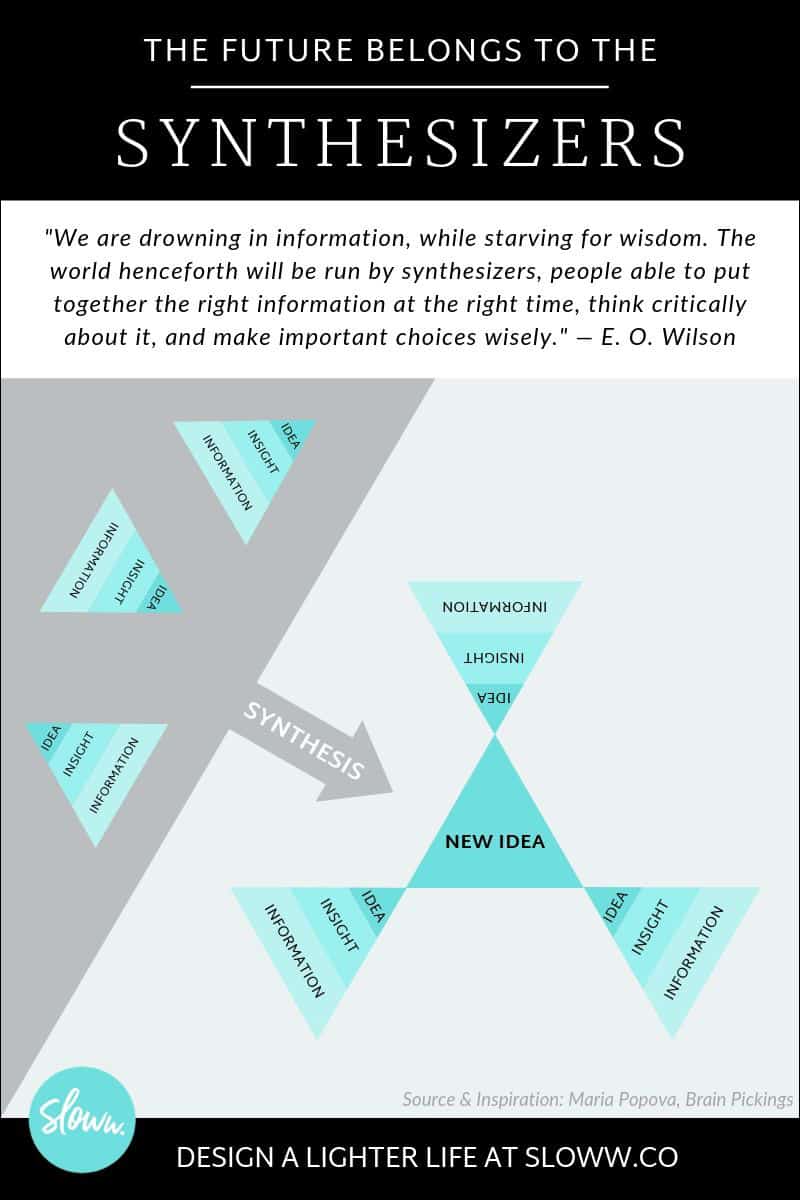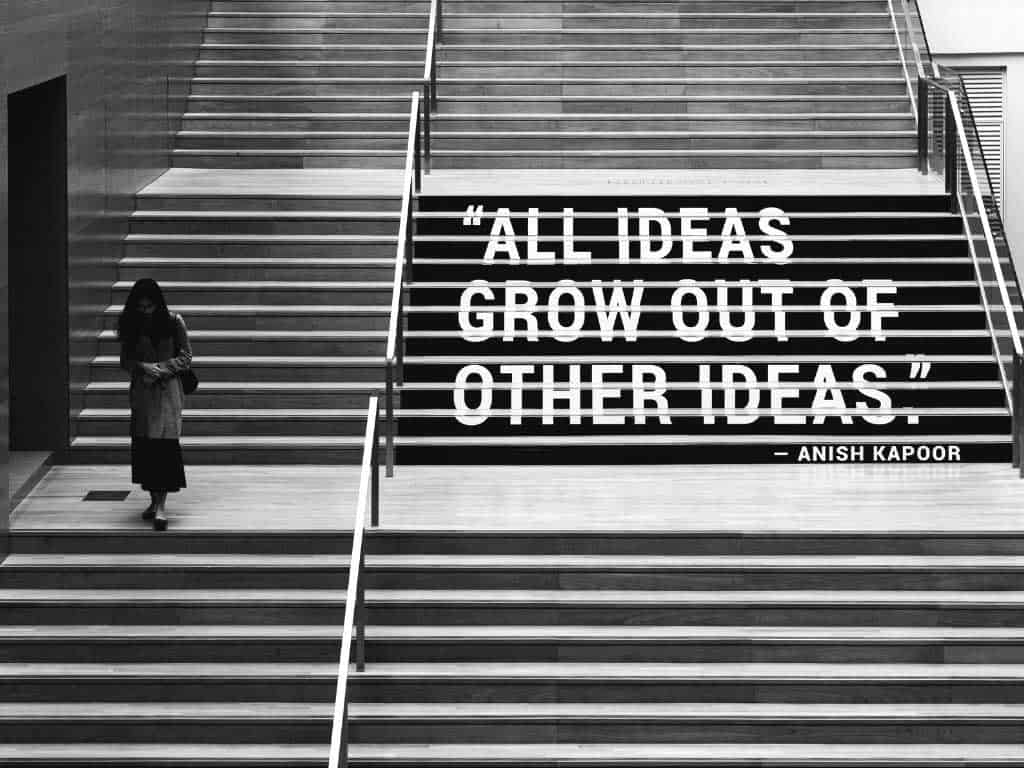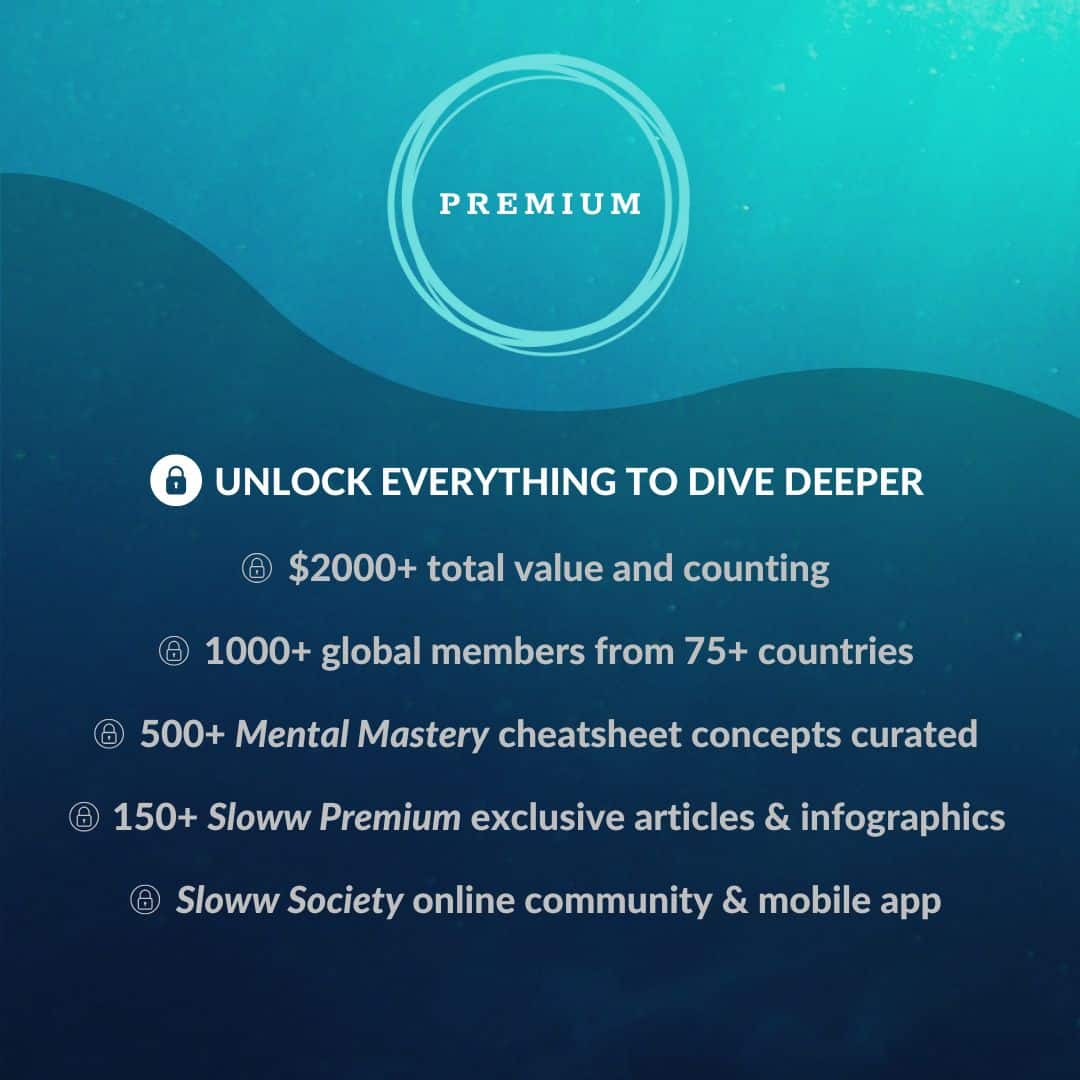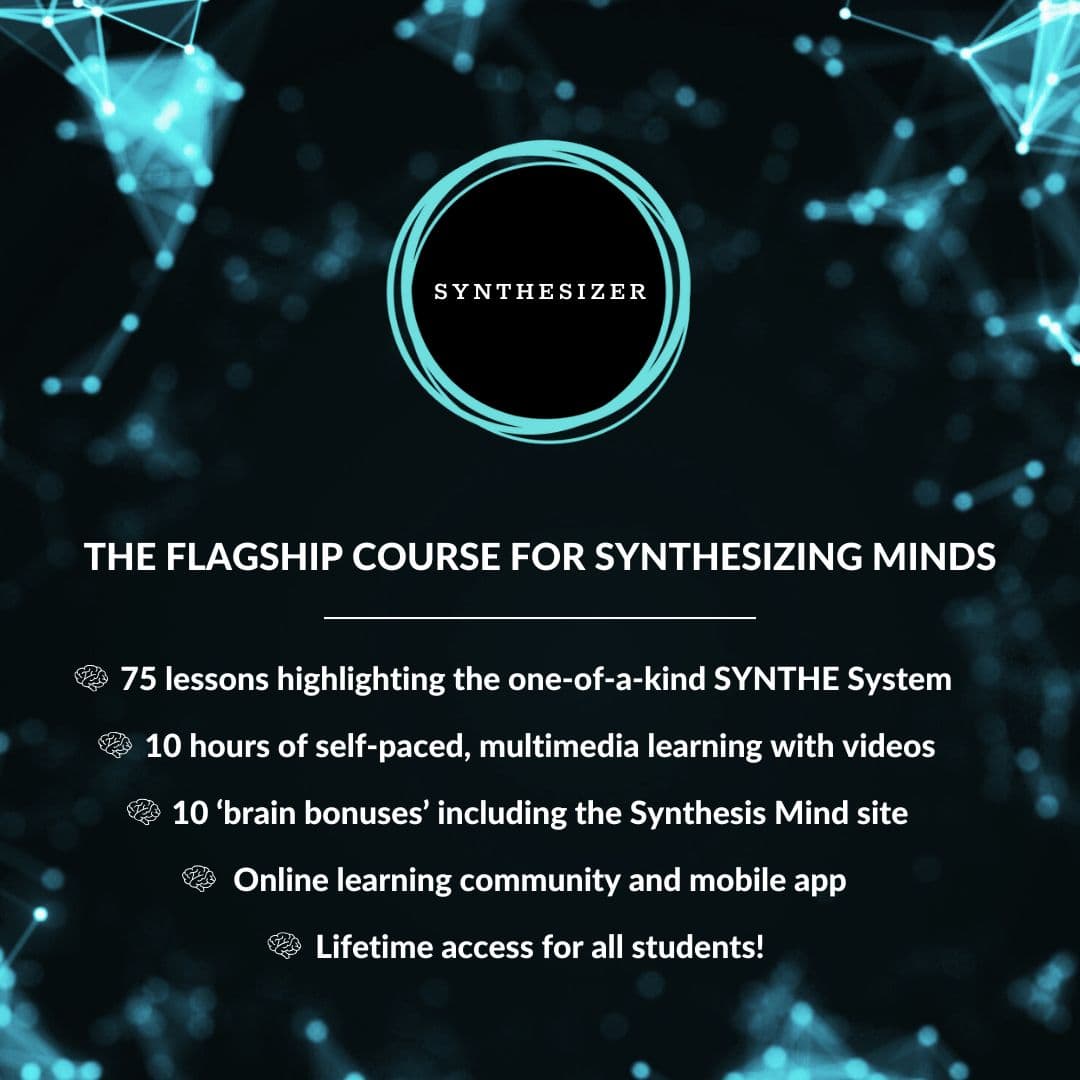
“One form of originality is creation. Another form is synthesis. People often focus so much on creating new ideas that they overlook the value of synthesizing ideas from different sources. Innovation usually mean connecting previously unconnected concepts.” — James Clear, author of Atomic Habits
In the previous post, we learned about combinatorial creativity—one of my top-three learnings from Maria Popova of Brain Pickings.
What enables combinatorial creativity?
Popova suggests it’s the power of the synthesizing mind (emphasis added in bold):
- “Celebrated creators – artists, writers, scientists, inventors – have always known the power of the synthesizing mind and have advocated for embracing the building blocks of combinatorial creativity.”¹
Synthesizers: Why the Future Belongs to the Idea Connectors
Defining Synthesis & Intellectual Needs
Here are the best definitions and descriptions I came across for synthesis and synthesizing:
- “Synthesizing is the process whereby a student merges new information with prior knowledge to form a new idea, perspective, or opinion to generate insight.”²
- “Synthesising involves combining ideas from a range of sources in order to group and present common ideas or arguments.”³
- “Synthesis is the most complex of the reading strategies. Synthesizing lies on a continuum of evolving thinking. Synthesizing runs the gamut from taking stock of meaning while reading to achieving new insight.”4
What drives synthesis?
It can often be triggered by intellectual need:
- “A specific form of intrinsic motivation; it is a desire to learn something. It has been recognized as critical in effective education and learning. Intellectual need arises when someone poses a question to themselves or others, either out of curiosity or to solve a specific problem.”5
- “Intellectual need is often greatest when there is a hole in an otherwise well-connected web of knowledge. Merely understanding a question and being unable to answer it is not sufficient to create intellectual need—intellectual need arises when a person believes the question to be interesting or important, and usually this involves fitting the question into a framework of well-understood ideas.”5
- “I thought that maybe there was an intellectual hunger for that sort of cross-disciplinary curiosity and self-directed learning.” — Maria Popova
What can you expect from an intellectual synthesizer?
- “He does not have the specialist’s knowledge of the matters he feels should enter into the synthesis. This would be an unreasonable expectation in the first place. He does however seem to have mastery of the fundamental concepts he chooses to make use of and an understanding of the structure of the problems he chooses for discussion. These achievements are the most one should expect from an intellectual synthesizer.” — Henry Winthrop
The synthesizing process has been happening since the beginning of humanity—in each individual human as well as humanity as a whole—and there’s a lot we should learn from it.

Learning from Humanity’s Collective Knowledge & Wisdom
Maria Popova poses a key question for our modern era:
Popova isn’t alone in celebrating the power of the synthesizing mind. Many of the greatest intellectuals and thinkers of the past and present believe in learning from humanity’s collective history.
Some estimate that 108 billion humans have lived on Earth. There are 7.7 billion alive today. That means:
- “The dead outnumber the living 14 to 1, and we ignore the accumulated experience of such a huge majority of mankind at our peril.” — Niall Ferguson
There’s so much we can (and should) learn from those who came before us:
- “Of all people only those are at leisure who make time for philosophy, only those are really alive. For they not only keep a good watch over their own lifetimes, but they annex every age to theirs. All the years that have passed before them are added to their own. Unless we are very ungrateful, all those distinguished founders of holy creeds were born for us and prepared for us a way of life. By the toil of others we are led into the presence of things which have been brought from darkness into light.” — Seneca, author of “On the Shortness of Life”
- “He who cannot draw on three thousand years is living from hand to mouth.” — Johann Wolfgang von Goethe
Here are some familiar modern names who appreciate learning from humanity’s history:
- “It comes down to trying to expose yourself to the best things that humans have done, and then try to bring those things in to what you’re doing.” — Steve Jobs
- “I don’t have any new lessons. But I often think that it’s not the new lessons as much as it is, really, learning the old ones again and again.” — Oprah, author of “The Path Made Clear”
- “Socrates supposedly said that we should employ our time improving ourselves by other men’s writings, and that in doing so we can ‘come by easily what others have labored hard for.’ Yes. That’s the point of literature — it is the accumulation of the painful lessons humans have learned by trial and error. For 5,000 years we’ve been recording this knowledge in books. The more hard knocks we can avoid by reading them, the better … Over those centuries, there has been an incredible filtering mechanism working for us, finding and highlighting the books that contain the most wisdom … that’s what we’re trying to do here — we’re trying to help others learn from the wisdom of other’s experiences. We’re trying to filter the good stuff to the top — to upvote it — to make it even more readily available than it was in our own lives.” — Ryan Holiday, author of “Stillness is the Key”
Just look at it as “borrowing”:
- “Learn to use the knowledge of the past and you will look like a genius, even when you are really just a clever borrower.” — Robert Greene
- “The great driver of scientific and technological innovation (in the last 600 years has been) the increase in our ability to reach out and exchange ideas with other people, and to borrow other people’s hunches and combine them with our hunches and turn them into something new.” — Steven Johnson
It’s critical because we each only have an indefinite yet finite amount of time here:
- “There’s always been a longing to gather the important things in one place. Some of the appeal of a Bible or the collected works of a big name author is the sense that amidst all the chaos and disparate sources of knowledge, someone has taken the trouble to distill, to compress, to say what is essential. In a world overflowing with information, what we most need is curation … Ultimately, life is only 700,000 hours long so we have to make sure the ideas we need don’t get lost – or take too long to find.” — The School of Life
The power is in sharing:
- “One of the greatest gifts we can give to another generation is our experience, our wisdom.” — Desmond Tutu
- “Knowledge, when shared, becomes like a grand, collective, inter-generational collaboration.” — Tim Urban
- “The best thing a human being can do is to help another human being know more.” — Charlie Munger
- “Take good ideas and make them available to a wide public.” — Alain de Botton
- “The best ideas are common property.” — Seneca

The Future Belongs—and has Always Belonged—to the Synthesizers
“We are drowning in information, while starving for wisdom. The world henceforth will be run by synthesizers, people able to put together the right information at the right time, think critically about it, and make important choices wisely.” — E. O. Wilson, biologist, theorist, naturalist and author
At first glance, you may assume these next quotes were written today. They are actually from 50+ years ago—possibly more relevant today than ever before.
- “In this time of divisive tendencies within and between the nations, races, religions, sciences and humanities, synthesis must become the great magnet which orients us all … (Yet) scientists have not done what is possible toward integrating bodies of knowledge created by science into a unified interpretation of man, his place in nature, and his potentialities for creating the good society.” — Oliver Reiser
- “The major thesis of this ‘search for synthesis’ is that the world requires a vast ‘integration of knowledge’ program to unify the globe spiritually and socially and give meaning and purpose to human existence.” — Oliver Reiser
This sentiment is shared by others:
- “In an increasingly complex world, the fragmented state of knowledge can be seen as one of the most pressing social problems of our time.” — via Gregg Henriques
- “The problems of modern man are interdisciplinary and multidisciplinary, that is to say, a proper solution of these problems requires information and methods which stem from many disciplines.” — Henry Winthrop
- “All of this is resulting in an increased recognition of the need to restore unity to learning. The recognition of the degree to which intellectual integration and scholarly synthesis are imperative, has been heartening.” — Henry Winthrop
We should all be primarily interested in timeless knowledge and wisdom that can be used to navigate the modern world:
- “We’ve created a culture that fetishizes the new(s), and we forget the wealth of human knowledge, wisdom, and transcendence that lives in the annals of what we call ‘history’ – art, literature, philosophy, and so many things that are both timeless and incredibly timely.” — Maria Popova
- “The only thing for certain is that everything changes. The rate of change increases. If you want to hang on you better speed up. That is the message of today. It could however be useful to remind everyone that our basic needs never change.” — Guttorm Fløistad
By being a student of life, you can harness the power of a synthesizing mind and help usher in humanity’s future.
- “We are approaching a new age of synthesis. Knowledge cannot be merely a degree or a skill … it demands a broader vision, capabilities in critical thinking and logical deduction without which we cannot have constructive progress.” — Li Ka-shing
- “The wisdom needed must be the creative synthesis of the best in past human effort, in contemporary proposals, and in the modes of action that are foreseen as humanity’s choices for its own future.” — Henry Winthrop (quoting Oliver Reiser)
Author Matt Ridley has one of the best TED Talks I’ve seen about the power of synthesis and combinatorial creativity throughout human history. He believes:
- “We’ve gone beyond the capacity of the human mind to an extraordinary degree. And by the way, that’s one of the reasons that I’m not interested in the debate about I.Q., about whether some groups have higher I.Q.s than other groups. It’s completely irrelevant. What’s relevant to a society is how well people are communicating their ideas, and how well they’re cooperating, not how clever the individuals are. So we’ve created something called the collective brain. We’re just the nodes in the network. We’re the neurons in this brain. It’s the interchange of ideas, the meeting and mating of ideas between them, that is causing technological progress, incrementally, bit by bit.” — Matt Ridley
Here’s to the synthesizers!
You May Also Enjoy:
- Combinatorial Creativity: The Art of “New” Ideas & Why Everything is a Remix
- “So, what do you do?” An Introduction to Synthesis, Integration, Interdisciplinarity, & More
Footnotes & Sources:
- https://www.smithsonianmag.com/innovation/combinatorial-creativity-and-the-myth-of-originality-114843098/
- http://ohiorc.org/adlit/strategy
- https://emedia.rmit.edu.au/learninglab/content/synthesising-0
- Harvey, Stephanie and Anne Goudvis. Strategies That Work. Chapter 10, p. 144
- https://en.wikipedia.org/wiki/Intellectual_need




